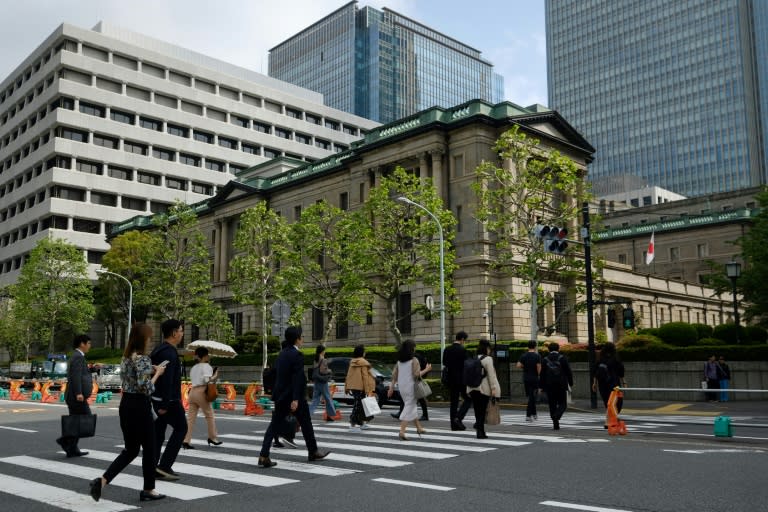Yen falls further as Bank of Japan stands pat on rates

The Bank of Japan kept its ultra-low interest rates unchanged Friday and stopped short of signalling another hike, pushing the yen to a fresh 34-year low against the dollar.
The slide, due in part to the differential between BoJ rates and others worldwide, stoked speculation that Japan might intervene in the market, possibly as soon as Friday if US inflation data is strong.
The BoJ called time on negative rates last month with its first rise in borrowing costs in 17 years as inflation finally settled around two percent after the "lost decades" of deflation and stagnation.
Friday's decision to keep its benchmark rate between zero and 0.1 percent was keenly awaited, with the bank saying that "accommodative financial conditions will be maintained for the time being".
But there had been speculation that the BoJ might respond to a drop in the yen to levels not seen since 1990.
BoJ Governor Kazuo Ueda signalled last week that the central bank could change monetary policy if the fall in the yen became "too big to be ignored".
But comments on the yen from Ueda on Friday "lacked any urgency", Charu Chanana at Saxo said, adding that the BoJ was surprisingly "dovish" again on interest rates.
- Global outlier -
The BoJ has been a global outlier in sticking to an ultra-loose policy while other central banks pushed rates up as they fought against surging inflation -- causing a wide differential that saw investors push into other currencies.
The standout among them has been the dollar, which has gained even more ground in recent weeks as a string of above-forecast US inflation readings fuels fears the Federal Reserve will keep rates at two-decade highs for longer than hoped.
A weaker yen is good for Japanese exporters but it pushes up the price of imports and the BoJ hiked its inflation forecast for the current fiscal year to 2.8 percent, from 2.4 percent previously.
With the currency sitting around three-decade lows against the dollar, speculation has grown that authorities could intervene in forex markets to provide support for the first time since 2022.
Business federations have also expressed unease about the fall in the yen, the worst performer among the Group of 10 major currencies this year.
At around 5:00 pm (0800 GMT) on Friday, the dollar bought 156.70 yen. However, Japanese stocks rose on relief that firms' borrowing costs would not rise.
Finance Minister Shunichi Suzuki warned Friday the government was "concerned" about the negative aspects of the weak yen, repeating that authorities will take "all possible measures" if necessary, Japanese media said.
Media reports before the meeting had suggested that the BoJ might pare back bond purchases, which might have eased pressure on the yen.
But although the language of the bank's statement was tweaked slightly, its stance appeared unchanged.
The BoJ has spent vast amounts on bonds and other assets to pump liquidity into the Japanese economy, targeting inflation of two percent that policymakers hoped would fuel growth.
The institution currently holds 592 trillion yen ($3.8 trillion) in JGBs, an amount equivalent to the size of Japan's gross domestic product in 2023.
kh-kaf/stu/pbt

 Yahoo Finance
Yahoo Finance 